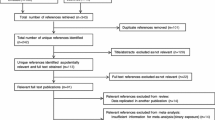Abstract
Caffeine is probably the most frequently ingested pharmacologically active substance in the world. It is found in common beverages (coffee, tea, soft drinks), in products containing cocoa or chocolate, and in medications. Because of its wide consumption at different levels by most segments of the population, the public and the scientific community have expressed interest in the potential for caffeine to produce adverse effects on human health. Reproductive-aged and pregnant women are ‘at risk’ subgroups of the population who may require specific advice on moderating their daily caffeine intake. This article highlights the implications of caffeine intake in pregnancy, reviews the latest evidence-based information available on this subject, and offers recommendations (practical advice) for the obstetrician–gynecologists proving peripartum care to these potentially complicated pregnancies.
Similar content being viewed by others
References
Kuczkowski KM (2007) The effects of drug abuse on pregnancy. Curr Opin Obstet Gynecol 19:578–585
Kuczkowski KM (2003) Anesthetic implications of drug abuse in pregnancy. J Clin Anesth 15:382–394. doi:10.1016/S0952-8180(03)00056-4
Kuczkowski KM (2003) Labor analgesia for the drug abusing parturient: is there cause for concern? Obstet Gynecol Surv 58:599–608. doi:10.1097/01.OGX.0000082148.97981.30
Gowda RM, Khan IA, Mehta NJ et al (2003) Cardiac arrhythmias in pregnancy: clinical and therapeutic considerations. Int J Cardiol 88:129–133. doi:10.1016/S0167-5273(02)00601-0
Kuczkowski KM (2003) Social drug use in the parturient: implications for the management of obstetrical anaesthesia. Med J Malaysia 58:147–154
Nawrot P, Jordan S, Eastwood J et al (2003) Effects of caffeine on human health. Food Addit Contam 20:1–30. doi:10.1080/0265203021000007840
Higdon JV, Frei B (2006) Coffee and health: a review of recent human research. Crit Rev Food Sci Nutr 46:101–123. doi:10.1080/10408390500400009
Grosso LM, Bracken MB (2005) Caffeine metabolism, genetics, and perinatal outcomes: a review of exposure assessment considerations during pregnancy. Ann Epidemiol 15:460–466. doi:10.1016/j.annepidem.2004.12.011
Boylan SM, Cade JE, Kirk SF et al (2008) Assessing caffeine exposure in pregnant women. Br J Nutr 100:875–882. doi:10.1017/S0007114508939842
Boylan S, Cade JE, Dolby VA et al (2008) Maternal caffeine intake during pregnancy and risk of fetal growth restriction: a large prospective observational study. BMJ 3(337):a2332
Bech BH, Obel C, Henriksen TB, Olsen J (2007) Effect of reducing caffeine intake on birth weight and length of gestation: randomised controlled trial. BMJ 334(7590):409
Oei SG, Vosters RPL, Van der Hagen NLJ (1989) Fetal arrhythmias caused by excessive intake of caffeine by pregnant women. BMJ 298:568–569
Fernandez O, Sbharrval M, Smiley G et al (1998) Moderate to heavy caffeine consumption during pregnancy and relationship to spontaneous abortion and abnormal fetal growth: a meta-analysis. Reprod Toxicol 12:434–444
Marret S, Gressens P, Van-Maele-Fabry G et al (1997) Caffeine-induced disturbance of early neurogenesis in whole mouse embryo cultures. Brain Res 773:213–216. doi:10.1016/S0006-8993(97)00938-4
Weng X, Odouli R, Li DK (2008) Maternal caffeine consumption during pregnancy and the risk of miscarriage: a prospective cohort study. Am J Obstet Gynecol 198(3):279.e1–8
Browne ML, Bell EM, Druschel CM (2007) Maternal caffeine consumption and risk of cardiovascular malformations. Birth Defects Res A Clin Mol Teratol 79:533–543. doi:10.1002/bdra.20365
Conflict of interest statement
None.
Author information
Authors and Affiliations
Corresponding author
Rights and permissions
About this article
Cite this article
Kuczkowski, K.M. Caffeine in pregnancy. Arch Gynecol Obstet 280, 695–698 (2009). https://doi.org/10.1007/s00404-009-0991-6
Received:
Accepted:
Published:
Issue Date:
DOI: https://doi.org/10.1007/s00404-009-0991-6



